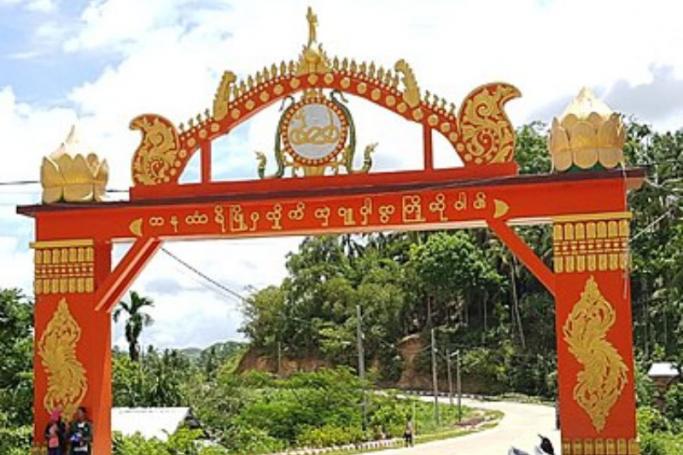Myanmar’s Tanintharyi Region seldom makes the headlines. But it is home to citizen journalist Myo Myint, an alias this hard-working reporter uses for his dangerous work chasing the news in this remote part of post-coup Myanmar.
Myo Myint wants to put Tanintharyi on the map given the plight of its citizens as they suffer due to the conflict and a downturn in the economy.
Tanintharyi Region is an administrative region of Myanmar, covering the long narrow southern panhandle of the country.
QUESTION OF TIMING
It would turn out that Myo Myint’s timing to enter journalism has been either fortuitous or unfortunate. In 2020, he signed up for a for a basic news writing training course given by a foreign news agency in Yangon. As a fledgling journalist, with a bachelor's degree in the unrelated field of physics, he wanted to learn about media communication. The course helped him to get started in the news field, but, as he found out, no subject or skill can be mastered in a short period of time.
Still, with the training provided by the course, Myo Myint returned to his township intent on giving it a go. Learning the ropes as a journalist proved tough. Challenges included finding sources for news stories, and the actual writing process. Although he gained tips from his superiors, over time he felt depressed and came close to quitting because he could not find a mentor.
But he soldiered on, in part because as a part-time hobby, he was driven to succeed, and also because in time he began to receive help from an editor he supplied stories to. He worked hard to chase down sources for news.
TOUGH FIELD
In Myanmar, local freelance reporters like Myo Myint are called Pote Sar. They are paid for each news article that they provide and gets published, and do not get a fixed salary.
Their success lies in the hands of editors who choose to use their stories.
Generally, freelance journalists usually earn less than permanent journalists of news agencies because the pay for an article depends on the length and the rates are low.
As Myo Myint has found out, modern-day media stories typically involve more than just providing text.
“I, myself have to shoot photos and videos required for the news. When the area is far away, I have to pay travel costs. Because I am a Pote Sar, freelance, with no fixed salary, I have to write more articles to cover my costs every month. When there is less news, I can't make enough to cover the costs,” Myo Myint told Mizzima.
“Even though I am still writing news effectively as a hobby, Pote Sar are not very respected in the world of journalism, I think. However, I am happy because I get the chance to inform people with videos and interviews,” he added.
EXCITING CAREER
Journalism has given Myo Myint access to an exciting world. He said he was proud that he was able to report on the 2020 Myanmar elections, focusing on Dawei District, and witnessing what he said was the transparency of the process – even though the election results were annulled by the Myanmar military.
Myo Myint recognizes the dangers posed to journalists in the wake of the February 2021 military coup.
Freedom of the press has been lost and many journalists are being targeted by the junta.
Regarding the killing and repression of journalists in Myanmar, UNESCO condemned the Myanmar junta’s actions and stated that journalists and civilians are to be protected according to the international human rights regulations. Likewise, France-based Reporters Without Borders (RSF) issued a statement to stop the violence and to target sanctions against the military junta for the deaths of journalists.
MEDIA CLAMPDOWN
After the coup, the Myanmar military tried to control the media in many ways. Nine private news outlets have had their licenses revoked. Junta leader Min Aung Hlaing prepared to put pressure on the media with Television and Radio laws established in 2015, by revising them to add more types of media – including social media - that were not included before in the law, with the potential of up to five years of imprisonment
Among the nine news agencies that the military council revoked licenses was the news agency Myo Myint was reporting for. He said his trouble has doubled because he is now acquiring news for an unlicensed news agency. Because of the many arrests and inspections by the authorities, he now has to rely on getting news photos from close people and interviewing online, instead of going out to get recordings in person. Because this news is not from primary sources, it is hard to interest the editors, and the amount of income he is able to make is less than before the coup, he said.
REPORTING ON THE RUN
“Because there are many pro-junta informers (Dalans) in the communities, I have to write on the run. I also have to be more careful because there is fabricated news and the sources are not strong. It is hard to cover the news about interrogation centres. I have to avoid the news propagated intentionally by the military,” Myo Myint said.
“It is getting harder to earn a living in this profession. I won’t be called to be based in a foreign country by a news agency because I am not a permanent staff member. Because the media license has been revoked, it will be hard for them (the media outlets) to help arrested journalists. Because I am on my own, I have to keep myself anonymous when writing news,” Myo Myint noted.
Myo Myint works in a difficult and dangerous field. Since the Myanmar coup, over 130 journalists have been arrested and more than 40 are still being detained. Over 30 journalists are on a warrant list and three were arrested and killed.












